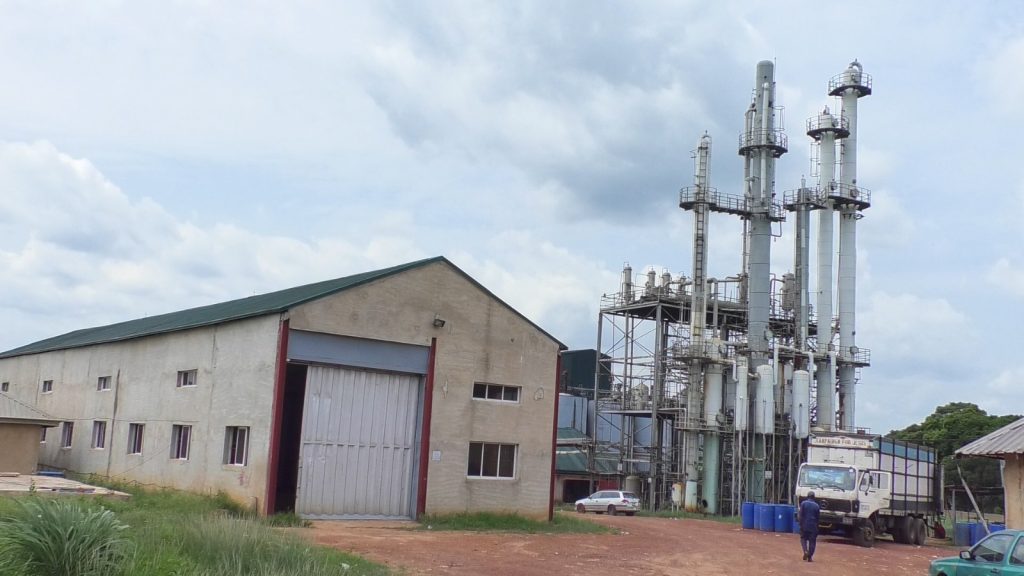Arinze Chijioke
This April, residents of Nomeh, a community in Enugu West local government woke up to discover that their only water source had been contaminated. While community members blame an Ethanol Company for the contamination, the company says it was not responsible. In this report, Arinze Chijioke looks at the conflicting narratives surrounding the contamination and how it destroyed livelihoods.
One morning in March 2021, Ikechukwu Eric’s three children returned from the Nvuna River where they had gone to fetch water with empty buckets. When he asked them what had happened, they told him that the water turned red.
Nvuna, the only water source in Nomeh, a community in Enugu West Local Government Area has existed for more than 10 decades and is being used by residents for cooking, washing and other house chores. It also serves other communities, including Ituku Ozalla and Agbogugu.
Nomeh, a predominantly agrarian community, has two major territorial divisions – Amaokoro and Amaigbo – with 10 sub-villages including Imeama, Amukabi, Uhuafor, Uhuorji, Obinagu, Umuene, Amegu, Umuchima, Amegu Agbo. These are the station quarters.
Immediately, Eric, who is the youth leader of Obinagu Amigbo, rode to the river on a motorcycle and met other women leaving without water and complaining that something must be done about the contamination.
Some residents who ignorantly drank the water took ill at the time. The spill also destroyed Rice, Cassava and other crops, threatening the people’s livelihoods. Dead fishes were floating on the water. Chickens that walked along the river banks and drank from it also died.
“I called the Nomeh community youth leader who said he also heard the complaint and soon, many residents gathered at the river.
“Afterwards, leaders of the community called a meeting and decided to search for the source of the pollution,” Eric said.
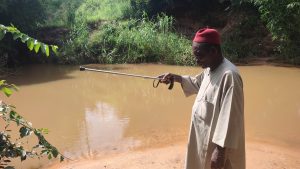
He claimed that he led the search team made up of youths and some elders from the community. He also claimed that they spent three days trailing the source, inside the bushes. On the fourth day, they discovered a location where pipe from an Ethanol production factory located at Ituku/Ozalla, D-Hap Enterprises Services Limited connected to the river.
According to him, it took more than two months before the odour completely disappeared and residents could use the water.
Fidelis Mba the paramount ruler of Amegu Agbo, one of the villages in Nomeh, claimed that he provided water for households in the community in 2021. He also took part in tracing the source of the contamination at the time.
After several reports of the contamination by community members, former Governor Ugwuanyi directed a team led by the Special Adviser to the Governor on Water Resources, Anthony Dubem Onyia and the Managing Director of EN-RUWASSA, Frank Omeje, to visit the Nvuna River on a fact-finding mission in March 2021.
At the end of their on-the-spot investigation, the team established a contamination after which they collected water samples for laboratory test. They also discovered that the effluent had destroyed all living organisms in the river including fishes, and that the water body emitted some odour.
As he addressed members of the communities, Onyia said that the government was concerned about the development and will constitute further sanction as soon as laboratory tests and more contact tracing are completed.
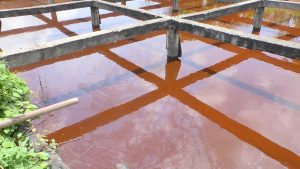
Company takes responsibility
After the 2021 incident, the company took responsibility. At the time, the Environmental Consultant of the company, Anozie Daniel, said that they also conducted a holistic analysis ordered by the state ministry of environment. According to him, every test was done along the line from the company in Ituku to Ozalla to Agbogugu and Nomeh.
“You could see the graduation. Samples of the test conducted and presented on March 29, 2021, were collected from different lines of the water body, beginning from the company,” he said.
“Nomeh was the least impacted community in 2021, given that it was the farthest from the company.”
He explained that at Ituku – which hosts the company – the Biochemical Oxygen Demand (BOD) was 448.00 mg while at Ozalla, it read 201.60 mg per litre. At Agbogugu, the BOD came down to 115.20 mg per litre then at Nomeh, the BOD was 48 mg per litre because as the pollutant flowed on the water body, it was diluting and containing.
BOD explains the amount of organic matter present in water, According to Water Engineer and Pollution expert, Temple Oraeki.
“When the BOD is very high, it means that there is a lot of micro-organisms in the water which attests to high contamination an indicator of good quality water, while a lower BOD indicates polluted and when it’s low, it means that there are less microbial contaminants in the water,” he said.
However, while community members say that a pipe from the company had discharged the waste in 2021, Tayo Adenaike, a consultant at the company said that the incident did not occur as a result of a direct spill from the company’s activities but after a tanker mistakenly dropped substance used in the production of Ethanol in the company.
After the contamination, the company constructed a borehole to help the communities access water. However, leaders in Nomeh claim that the borehole constructed by the company located at the station quarters, only worked on the first day it was installed. Eric said that the borehole could not have served the entire community even if it worked.
“The company had met with our traditional ruler, Mba Chukwueze, who gave them the location for the construction.
“But after it was completed, we don’t know what happened, it never functioned beyond the first day,” said Eric.
When this reporter visited the location of the borehole, it was overgrown with bushes, with some of the taps removed.
Adenaike questioned why the community did not complain to the company when it noticed that the borehole was not working as they claimed, adding that they should have also tried to fix it because it could have been a maintenance issue.
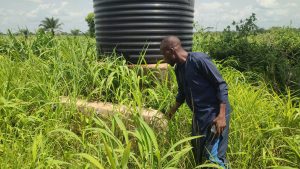
A repeat contamination
On April 18 2023, members of Nomeh community woke up to discover that the Nvuna river had been contaminated again. The next day, youths, women and some leaders of the community protested to D-HAP LTD which they had accused again of the contamination.
With placards carrying inscriptions such as: Stop killing Nomeh’s children, D-HAP LTD, stop the serial poisoning of Nomeh River, they marched to the entrance gate of the company where they were locked out.
In a letter dated April 18, the President General of the Community, Ogbonna Nwachukwu, said that the discharge comes barely two years after the March 2021 incident which destroyed the aquatic life source, farms, environment, and invariably the health and well-being of Nomeh people.
“With the latest spill, residents are unable to access water for consumption, domestic needs and irrigation of their farmlands.
“Our children have been picking and eating the floating fish killed by the poisonous substances, which could result in severe health situations and death now and in the near and distant future,” the letter read.
30 pigs lost to contamination
Since 2009, Anekwe Jonathan has managed a flourishing piggery business in the Nomeh community, using the money earned to take care of his family. He always feeds the pigs with water from the Nvuna River.
As usual, he expected to make huge gains when he bought a set of pigs which cost him between N15,000 to N20,000. Sadly, following the contamination, he claimed he lost 30 pigs, with each of them costing between N30000 and N50,000 naira. Some of them were pregnant and due for delivery.
“I did not notice what was happening early enough till a member of the community spoke of how he saw dead fishes in the river.
“I usually pay people who go the river to fetch water which is used to feed the pigs, they did not realise that it was contaminated and we were not expecting a repeat of the 2021 incidence,” he said.
Jonathan has about 10 rooms, which used to house 50 pigs. Now, he has less than 10 pale-looking pigs because there is no water to feed them and he buys 25 litres of water for N150.
“I sold each one for N10,000 after they died, I threw some of them away and that affected my income, he said.
“I hope the government will shut them down completely to avoid another repeat.”
Comfort Jonathan was part of the women who protested the company following the contamination. She says it has affected her Cassava business because those she buys from could not harvest anything from their farms.
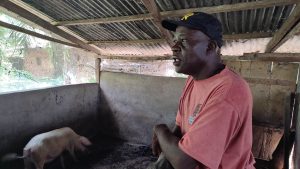
The woman leader of Amigbo village, Victoria Uba, does irrigation farming, depending on water from the river to water her Fluted Pumpkin (Ugu) leaves on the farm. Now, she has lost everything. They have turned yellow and she is looking for another location where she can farm. Her husband has abandoned his farm close to the river too.
In 2021, the contamination affected her son’s health after he mistakenly drank the water. She says it has become difficult to feed her 8 children, having lost her source of livelihood.
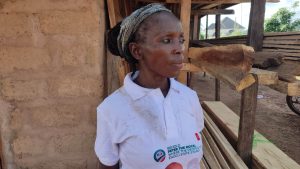
Another victim, Chukwudobelu, is into palm kernel processing. Since the contamination, he said he has not processed his nuts and now, they are dried up and packed inside his compound.
Company denies allegations
After the 2021 spill, the Production manager of D-Hap Enterprises, Mr F.M. Okeke, claimed that the company introduced measures that will help the company manage its waste to avoid cases of spill, including the use of a truck to evacuate effluent from the company to a government-designated point of discharge.
He explained that the company later introduced a Bioreactor and waste treatment plant -which was seen by this reporter – and has also built bond walls and ditches to collect any form of waste in case of accidental discharge and that it had also translated into the use of Gas for its burners from the black oil it was used initially for environmental sustainability.
“So, it is surprising that we are being accused of the contamination even when we don’t discharge into the gutter that flows to the rivers.
“We suspect sabotage because we used to hire trucks. But now, we use our own to ensure that the drivers get to the exact site,” he claimed.
He also disclosed that the wastes generated by the firm were disposed at a waste dump site approved by the state government which is paid for on monthly basis by the company.
Adenaike also claimed that the factory has an effluent disposal unit where all waste is channelled, hence nothing the company produces goes outside. He also said that Nvuna, which is a long stretch of river that overflows its banks during the rainy season, might have been contaminated by debris or other human activities.
He said it was surprising that Ituku – the host community – and other communities through which the river passes do not complain about any damage done to the environment and water source but Nomeh, which is the farthest community does.
Daniel Chukwudobelu, one of the leaders in Nomeh said that the company cannot claim not to be responsible for the latest contamination and still offers to donate a trailer load of sachet water to the community.
“Our concern is for them to find alternative means to discharge their waste other than the river.
“We are not saying they should not do their business, but they also have to be concerned about our welfare.
Agbogugu records contamination contrary to claims
This reporter reached out to residents of the other communities to confirm whether there have been cases of contamination.
Contrary to claims by the company that Nomeh was the only community complaining, Mathias Mbogu, a resident of Agbogugu said that residents of one of the villages in the community complained about contamination of their rivers as a result of activities of the company this year, destroying fishes and crops close to the river.
“That was not the first time it happened but many people did not hear about it because we did not protest.
“After previous contaminations, the company came and dug a borehole for the community and promised not to contaminate the water again, but they continued,” he said.
He alleged that the company must have prevailed upon some leaders of the community who in turn prevailed on the people not to protest despite the contamination of their river.
“The borehole has been working; they would not have provided one if they did not contaminate our river.
“We did not lose anyone in the community neither did we record any sicknesses because we discovered on time,” he affirmed.
However, Kennedy Okolie, a resident of Ituku said that there had never been any complaints by the community because the company is not close to the community but almost along the expressway.
A resident of Ozalla, which is close to Ituku, Mr Arinze, also said that the community has not recorded any case of contamination from the company. According to him, the people would not have kept quiet had there been any case of contamination.
“Even the hospital in Ituku uses water from the river and nobody has said anything about contamination.
“If Nomeh is complaining, the company may be channeling the whole pollution to the community,” he claimed.
Amobi Nwafor, another resident of Agbogugu said that residents of Obinagu, a village which is located close to the company, have often complained about the stench coming from the community and the destruction of their water.
Suspected foul play
A youth leader in one of the villages in Nomeh alleged that some elders in the community were collecting money from the company hence they sometimes try to persuade youths not to speak up each time the river is contaminated.
“They do not care about the people but only use their positions to collect money from the company, “he alleged.
“They are usually not happy whenever we talk about the contamination, they tried to stop us from protesting the last time, but we insisted.”
Speaking further, he said “sometimes, they go behind us to pursue their own interest at the company but they cannot overpower the community because we have decided not to listen to them.”
After the latest contamination, the state government ordered the Director of Administration at the Ministry of Environment and Mineral Resources, Matthew Abia to temporarily seal the company on April 29, a decision which was taken at the meeting of the State Executive Council (SEC).
But findings show that the company resumed operations less than a month after it was sealed following an order by Ugwuanyi whom the company had met before he left office and reminded of how it pays money to the government for the waste dump site provided by the government.
A source who prefers not to be mentioned for security reasons also said that Abia was suspended after he sealed the company because the governor allegedly claimed that the SEC did not give any approval for the sealing.
Youths in Nomeh say they will no longer take it lightly with D-Hap should the company discharge waste into the Nvuna river again.
This Report is part of activities by the Ikenga Media & Cultural Awareness Initiative (IMCAI) under the Collaborative Media Engagement for Development Inclusivity and Accountability Project, a multi-level intervention for media independence and government accountability, managed by the Wole Soyinka Centre for Investigative Journalism (WSCIJ) and supported by MacArthur Foundation.

